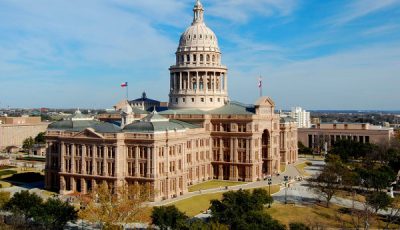Michigan Strip Club Sues SBA Over COVID-19 Disaster Loan Policies
 FLINT, Mich. – In a complaint filed Wednesday, DV Diamond Club of Flint, the parent company of a Flint, Michigan strip club called “Little Darlings” alleges that if the U.S. Small Business Administration (SBA) denies a COVID-19 Economic Injury Disaster Loan application submitted by the club Monday, doing so would violate the club’s rights under the First and Fifth amendments.
FLINT, Mich. – In a complaint filed Wednesday, DV Diamond Club of Flint, the parent company of a Flint, Michigan strip club called “Little Darlings” alleges that if the U.S. Small Business Administration (SBA) denies a COVID-19 Economic Injury Disaster Loan application submitted by the club Monday, doing so would violate the club’s rights under the First and Fifth amendments.
In addition to the SBA, DV’s complaint also names as defendants Jovita Carranza, the Administrator of the Small Business Administration, the U.S. government and Steven Mnuchin, the U.S. Secretary of Treasury.
In its complaint, DV notes that its club is “currently shuttered as a result of the emergency ‘shelter-in-place’ executive order issued by the Governor of Michigan as a result of the COVID-19 pandemic,” and that as a result of the ordered closure, it has “suffered significant business losses, but plans to reopen when legally permitted to do so.”
“In order to mitigate its business losses and to provide monetary relief to its employees – since at least 75% of PPP loans are to be used for employee wages and salaries, DV sought out to apply for a PPP loan,” the company states in its complaint, adding that it filed for a Paycheck Protection Program (PPP) loan “on or about April 6” through the Oxford Bank in Lake Orion, Michigan.
“DV is fully qualified — but for the Regulations and the SOP (Standard Operating Procedure) or the SBA’s application thereof — to receive a PPP loan under all relevant statutes, regulations, and procedures,” DV states in the complaint. “However, DV reasonably believes that its Application will be rejected or fatally delayed due to the SOP and/or the Regulations.”
The company further states that it “has learned that numerous other similar businesses, which presented non-obscene female performance dance entertainment of an ‘exotic,’ ‘topless’ and/or fully nude variety have had their applications for PPP loans rejected by their SBA lending banks, or derailed, on their bank’s belief that the business is disqualified by the Regulations and/or the SOP.”
“Specifically, DV has learned that other similar establishments have had their applications for PPP loans rejected on the belief that the clubs present ‘live performances of a prurient sexual nature’ within the meaning of 13 C.F.R. § 120.110(p),” the complaint adds. “DV reasonably fears its Application will suffer the same fate as the applications of these other businesses which have had their applications denied.”
DV asserts that none of the live performances at its club are “are unlawful or obscene,” adding that “neither DV nor any of the entertainers who have performed on its premises have ever been charged, let alone convicted, of any crimes of obscenity.”
The company said it “also fears that the Regulations and the SOP will cause its Application to be delayed until all PPP loan funds are exhausted; therefore potentially rendering any later request for judicial relief to be moot.”
Not being able to secure a PPP loan could lead to the club failing – thereby depriving both the club, its performers and patrons of the exercise of their Constitutional rights, DV asserts in its complaint.
“In the event that DV is unable to obtain PPP loan it may lack the staff and/or funds to reopen following the COVID-19 pandemic, resulting in the permanent ruination of its business; the inability of DV to engaged in protected First Amendment activity; and the inability to DV’s staff, entertainers, and customers to continue engaging in or viewing protected First Amendment activity,” the complaint states.
DV argues that the pertinent regulations and standard operating procedures (SOP) of the SBA “violate and are contrary to the First Amendment of the United States Constitution, on their face and as applied to Plaintiff, for numerous and various reasons.”
Specifically, DV asserts that the regulations and SOP “are impermissible content-based restrictions on speech and expression that cannot pass muster under strict scrutiny… impermissible content-neutral restrictions and expression that cannot pass muster under intermediate scrutiny… fail to conform to the constitutional standards regarding obscenity… violate the doctrine of unconstitutional conditions” and “are unconstitutionally vague under the vagueness standards for matters impacting speech and expression.”
“As a direct and proximate result of the unconstitutional aspects of the Regulations and SOP and the Defendants’ and their delegates’ application of the Regulations and the SOP against DV and its interests, DV, DV’s employees, and the entertainers who perform on DV’s premises have suffered and will continue to suffer irreparable injuries, including but not limited to financial ruin, business ruination, and the inability to present protected First Amendment protected entertainment,” DV argues in the complaint.
DV says the regulations and SOP are also “contrary to the Fifth Amendment of the United States Constitution, on their face and as applied to Plaintiff.”
DV is not seeking any monetary damages in its complaint (other than attorneys’ fees and costs incurred in filing the complaint); rather, it is asking the court for a temporary restraining order and both a preliminary and permanent injunction “enjoining the Defendants, as well as their employees, agent and representatives, including the SBA’s lending banks, from enforcing or utilizing in any fashion or manner whatsoever, 13 C.F.R. § 120.110(p) and SBA SOP 50 10 5(K), Ch. 2(III)(A)(15) in regard to loan applications made pursuant to the Payroll Protection Program of the CARES Act.”
As part of those orders, DV also asks the court to “order the Defendants… to notify, as expeditiously as possible, all SBA lending banks to immediately discontinue utilizing 13 C.F.R. § 120.110(p) and/or SBA SOP 50 10 5(K), Ch. 2(III)(A)(15) as criteria for determining PPP loan application eligibility, and to fully process all PPP loan applications without reference to such regulations and procedures.”
DV also wants the court to “order the Defendants, as well as their employees, agent and representatives, including the SBA’s lending banks, to restore Plaintiff to its place in the application queue as it was at the time of application in the event that its application has already been formally denied, derailed, or paused because of the challenged regulations and procedures challenged here.”
The defendants have not yet filed a response to DV’s complaint. YNOT will continue to track the case and report on future developments as they unfold.













